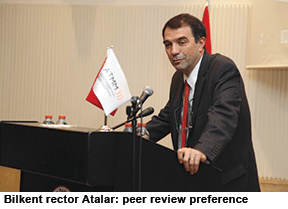 Universities should consider reducing the salaries of academics who fail to impress experts in their discipline, according to a university president who has pioneered the practice.
Universities should consider reducing the salaries of academics who fail to impress experts in their discipline, according to a university president who has pioneered the practice.
Abdullah Atalar, rector of Bilkent University in Turkey’s capital Ankara, says his institution has chosen to ignore research metrics when assessing whether an academic deserves a pay rise or a promotion. Instead, university leaders canvass opinion from experts in the academic’s discipline from outside Bilkent about how well an individual scholar had performed in recent years. “We will ask leading universities in the US if they would hire this guy or promote him,” Prof. Atalar said. “If they say they would not promote him, we do not promote him.”
An electrical engineer, Atalar believes Bilkent’s pay structure is preferable to those at other universities, which link performance-related pay to research output or its impact. “Metrics might indicate that someone is doing very well in their field, but peer review might show the exact opposite,” he told Times Higher Education.
More universities should think about introducing Bilkent’s model of “peer review for pay”, he argues, although he says acknowledging that many institutions — including most in Turkey — would be prevented from doing so by government regulations. Bilkent, a private university founded in 1984, is “not limited by the same government rules in place at state universities”, explains Atalar.
Bilkent’s freedom to set academic salaries according to its own criteria is one of the reasons for its success despite its relatively short history. It was ranked Turkey’s best university under 50 years old in the Times Higher Education 100 Under 50 rankings in 2014, and the country’s fifth best overall in the THE World University Rankings 2014-15, published in October.